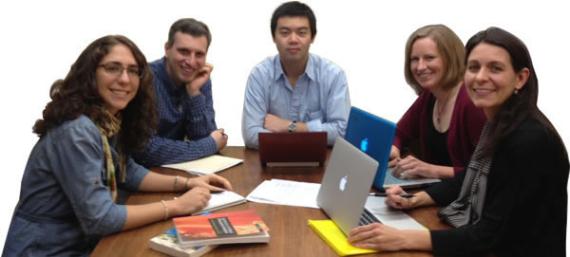When people think about research in the English Department, they are likely to imagine solitary scholars surrounded by books in the library. But when students from Professor Anis Bawarshi’s graduate seminar, “Knowledge Transfer and Composition,” designed a research project, they envisioned a collaborative study that would bring together theory and methods from education, social sciences, and composition studies.
Their project, titled “Transfer of Learning and Third-Space Collaboration: Preparing Students for Cross-Disciplinary Writing,” arose from the shared experience of reading and discussing research on how students transfer learning from one context to the next. During Summer and Fall 2012, four students designed and implemented a transfer study underBawarshi’s guidance: Lilly Campbell (English), Alison Cardinal (Lecturer, Interdisciplinary Arts and Sciences, UW-Tacoma), Roger Chao (English) and Misty Anne Winzenried (Education). Drawing on what they learned in Bawarshi’s class, the team dug deep into recent research in composition which uses the concept of “knowledge transfer” to explain the complex processes that are involved when students try to adapt and repurpose writing knowledge from one context to another. They discovered that little research, however, had examined how students reflect on their learning in locations outside of the traditional classroom, such as study groups, writing centers, and studio courses—what are known as “third spaces.” Further, they noticed that few studies had considered transfer of learning by examining students’ collaborative interactions and conversations with one another. Thus, Campbell, Cardinal, Chao, and Winzenried worked to design a study that could consider the relationship between third-space collaboration and transfer of writing knowledge.
The group began by identifying students enrolled in the University of Washington’s Freshman Interest Group (FIG) program, who were enrolled in a composition course (ENG 111, 121, or 131) alongside one other disciplinary class and a general studies class. The cohort program was chosen as a site for the study because it combines an interdisciplinary environment with a class focused on writing.
The first step of the study was to create focus groups of students from the same cohorts that would meet multiple times over the course of the quarter so that the researchers could listen in on the connections students were making among their courses. At focus-group meetings students were asked to discuss their struggles and successes in their current classes, how their college experience compared to high school, and where they saw connections between the different learning that was happening in each class. Each meeting also included a collaborative activity for students that facilitated drawing connections between their past and present writing experiences.
Once they began transcribing the conversations from focus-group meetings, the research group had to determine a methodology for finding themes and patterns in the data to better understand how the conversations were preparing students to make connections that lead to knowledge transfer. In meetings with Bawarshi, they collaborated to develop four larger categories: Genre, Context, Collaboration, and Disposition. They identified these as key variables in extending or limiting students’ abilities to make connections across locations of writing. For example, how students define the types of writing they are doing (and their attitudes about them) affects how they are able to make connections between writing in different courses. Likewise, a student’s stance on learning and how students position themselves in relation to one another can extend or limit their ability to transfer knowledge. The nature of the collaborative exchange—what helps students open up conversations and what shuts collaboration down—plays an important role in getting students to a point where they are comfortable making connections that are nuanced and complex.
To fund their research, the group was awarded a modest English Department Expository Writing Program (EWP) grant. They presented their preliminary findings at the College Composition and Communication (CCC) Research Network forum in March and have plans to continue presenting their research and eventually publish a coauthored article. They will also share their findings with instructors in the EWP. Finally, they will design a workshop and offer a formal presentation of their research to help instructors better contextualize the interdisciplinary experience of their first-year students. All agree that the collaborative nature of their research project has provided opportunities for professional development while also contributing significant findings to the field of writing research.
